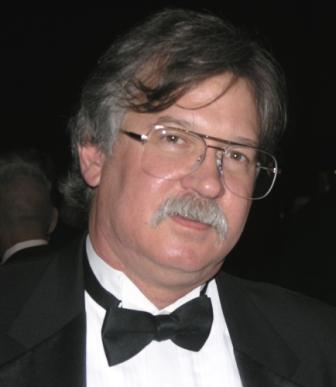2006 COMMUNICATOR AWARD RECIPIENT
Mark Carreau

Mark Carreau.
NASA photo.
[Dyson, Marianne, 2006 RNASA Program Book, March 24, 2006]
The RNASA Board of Directors recognized Mark Carreau with the 2006 Space Communicator Award. The citation states that Carreau "has distinguished himself for his work ethic, his professional ethics and his skill for communicating complex issues in an understandable, interesting and exciting manner. In doing so, he has contributed greatly to the public's understanding of and appreciation for the accomplishments of the American space program."
The Space Communicator award was created in 1997 in honor of KTRK, Channel 13 space reporter and long-time RNASA Advisor Stephen Gauvain who was tragically killed in a car accident in 1996. The Award is presented to an individual or team that makes exceptional contributions to the public's understanding of and appreciation for the value and benefits of space exploration. Previous recipients include William Harwood of CBS, Miles O'Brien of CNN, Elliot Pulham of the Space Foundation, and the NASA-Contractor Communications team that responded so adeptly after the Columbia accident.
Mark Carreau has been a daily newspaper reporter for over thirty years. A native of Wichita, Kansas, he graduated from the University of Kansas in 1972 where he majored in communication theory and studied pre-medical science courses. He earned a master's degree in journalism from Kansas State University in 1974. After graduation, Texas was his first choice of places to live and work. While he hoped to use his educational background to one day write on medicine and science, he never in his wildest dreams believed he would report on space exploration.
Carreau began his career in Texas in 1974 with the Orange Leader. He moved to the Fort Worth Star Telegram, Arlington Bureau in 1977, and joined the Houston Post in 1979 as the City Hall reporter. Carreau joined the Houston Chronicle in 1984.
January 28, 1986 was his first day on the space beat, the day of the Challenger tragedy. He compassionately reported about the tragedy and the effect it had on the families, friends and co-workers of the Challenger crew. Through the subsequent investigation, he demonstrated great ability to understand complex, technical issues and convey them to the public.
He wrote about Return-to-Flight following both Space Shuttle tragedies, and in between he reported on Shuttle science missions, robotic missions to Mars and other worlds, servicing of the Hubble Space Telescope and construction of the International Space Station. He's reported from Houston, Washington, Florida, California and other places where the space story continues to unfold.
Passionate about space, Carreau works tirelessly and demonstrates a rare compassion that leads him to honestly seek out and report the truth in a way that distinguishes him in his field. He has earned a reputation in the space community as a professional journalist whose honesty and integrity are matched only by his diligence to tell the story, whether it is good news or bad news.
Carreau has said that space fascinates him. He invests the time to learn about space, its complex technology and science. In an age of Internet postings and blogs, where the term "fair and balanced" is often exaggerated, Mark Carreau abides by true journalistic values. He checks his facts, he seeks answers, he explains both sides of an issue, he is accurate and he is trusted by his peers and by the members of the space community about which he reports, and about which he cares.
